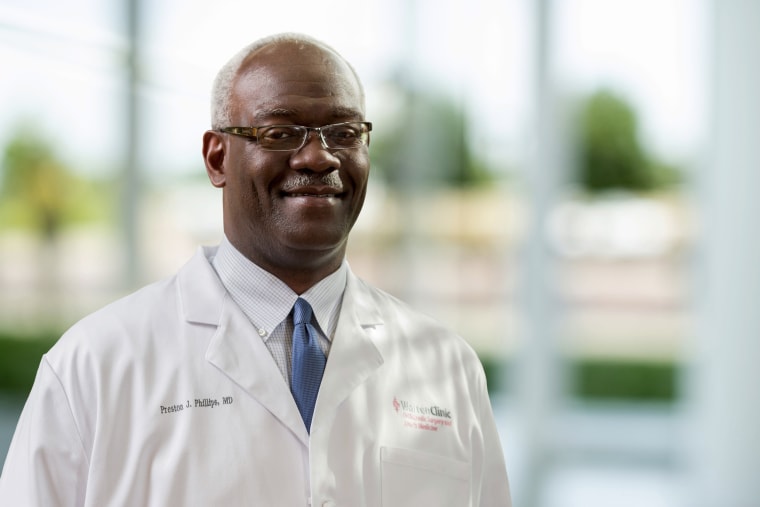The fatal shooting of Dr. Preston Phillips, one of the four people killed this week during a shooting at St. Francis Hospital in Tulsa, Oklahoma, shocked physicians across the country, and especially other Black orthopedic surgeons.
He was a “unicorn,” Dr. Alonzo Sexton said. It takes one to know one; Sexton is a Black orthopedic surgeon, too. Of 30,000 physicians in America in this discipline, only about 600 are Black, representing less than 2 percent of all orthopedic surgeons, according to 2018 data from the American Academy of Orthopaedic Surgeons.
“Yes, it’s a pretty small group,” said Sexton, whose practice is in Atlanta. He and a group of other Black orthopedic physicians are building what he said will be the largest all-Black orthopedic practice in the country. “And that will take only six of us. That’s how low the number is and that’s how rare and special Dr. Phillips was.”

Sexton said their specialty is among the “least diverse” because of the difficulties in obtaining residencies. Unlike other areas of medicine, where candidates can choose a medical college to attend, in orthopedics, schools and prospects have to be matched.
“So, you rank the schools or the programs that you want to go to and the programs rank you,” he explained. “And if there’s a match, then that’s where you end up going. So, it’s highly competitive and a lot of times, with a lot of evaluations, there’s potential for bias. And that bias exists in orthopedics. It has not really done a great job of extending the pipeline.”
Phillips studied at Harvard Medical School and worked with renowned spine surgeon Augustus White at Beth Israel Deaconess Medical Center in Boston. He also frequently traveled to Africa to provide care in underserved nations.
Dr. Eric Carson, a Black orthopedic surgeon in St. Louis, said he was devastated when he heard Phillips, his friend and colleague, had been gunned down at a Tulsa hospital this week. But Carson was not surprised that the shooting took place.
A patient purchased a rifle at 2 p.m. and went on his rampage inside the hospital three hours later. In a letter found on his body, the gunman “made it clear that he came in with the intent to kill Dr. Phillips and anyone who got in his way,” Tulsa Police Chief Wendell Franklin said Thursday.
“Back surgery hurts a lot,” Carson said, surmising that the patient likely felt as though his pain was being ignored. “Dr. Phillips is a very, very good surgeon and does very complex surgeries. But this was a really disgruntled patient.”
Carson, the former president of the J.R. Gladden Society, the national organization of orthopedic physicians of color, put it simply: “Pain brings out the worst in people,” he said.
“The sad part is that something like this can be anticipated. This is part of practicing medicine, which is truly unfortunate these days,” he added.
Carson said the attack reminded him of an incident 20 years ago, while studying at Harvard Medical School. A patient took a doctor hostage and prompted him and other students to take cover under desks. The situation was defused, but he absorbed the potential for patient-to-physician violence.
“If you ask doctors around the country, 99 percent of them will say they have been threatened or had to have restraining orders or had to fire clients because of threats,” Carson said. “I know doctors who carry concealed weapons for cases like this.”
Carson said in addition to a general need for gun control measures across the country, he said hospitals also needed metal detectors.
“I have to get a background check as a doctor, but we don’t do them for people who want to purchase rifles? It makes no sense,” he said. “I was in the Army. These weapons, AR-15 rifles, are used for combat. It should not be sold to the general public. It’s just tragic.”
Ultimately, the loss will be felt in Tulsa and across the country, the doctors said.
“He was needed,” Sexton said. “It’s important that Black patients have Black doctors that take care of them. And in orthopedics, one in two adults has a musculoskeletal problem, which is what orthopedics takes care of. So, half of the population has some issue that they need to see an orthopedic doctor for, and, again, with such small numbers of representation, a lot of Black and brown patients don’t have access to doctors that look like them.”
